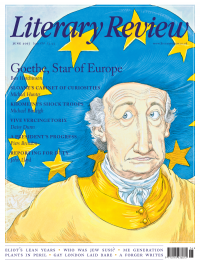Tim Harris
Heir Loss
The Prince Who Would Be King: The Life and Death of Henry Stuart
By Sarah Fraser
William Collins 330pp £25
Henry Frederick Stuart, born at Stirling Castle on 19 February 1594, was the eldest child of King James VI of Scotland. Following his father’s accession to the crowns of England and Ireland upon the death of Elizabeth I in 1603, he became the heir to the thrones of three kingdoms. Created Duke of Cornwall that year and installed as Prince of Wales in 1610, Henry was to die on 6 November 1612, at the age of eighteen, of what was probably typhoid fever. Quite different from his father – he was charismatic, brave, cultured and deeply committed to reformed causes – Henry had already gained a certain celebrity status in Europe and was coming to be regarded by many as England’s great hope for the future by the time of his death. He was replaced as Prince of Wales by his younger brother Charles, who succeeded as king in 1625, and we all know how that turned out: Charles provoked all three of his kingdoms to rebel against him and, after suffering defeat in two bloody civil wars, was tried and executed for treason in January 1649. Henry’s story is thus one of the great what ifs of English history: how might things have been different if James VI and I had been succeeded by Henry IX and not Charles I?
There have been previous studies of Henry, though they have tended to focus on specific aspects of his life. Sarah Fraser now offers us a full, up-to-date biography of this remarkable young prince. The book is intended to be accessible to a broad audience and is a light read, with

Sign Up to our newsletter
Receive free articles, highlights from the archive, news, details of prizes, and much more.@Lit_Review
Follow Literary Review on Twitter
Twitter Feed
Though Jean-Michel Basquiat was a sensation in his lifetime, it was thirty years after his death that one of his pieces fetched a record price of $110.5 million.
Stephen Smith explores the artist's starry afterlife.
Stephen Smith - Paint Fast, Die Young
Stephen Smith: Paint Fast, Die Young - Jean-Michel Basquiat: The Making of an Icon by Doug Woodham
literaryreview.co.uk
15th-century news transmission was a slow business, reliant on horses and ships. As the centuries passed, though, mass newspapers and faster transport sped things up.
John Adamson examines how this evolution changed Europe.
John Adamson - Hold the Front Page
John Adamson: Hold the Front Page - The Great Exchange: Making the News in Early Modern Europe by Joad Raymond Wren
literaryreview.co.uk
"Every page of "Killing the Dead" bursts with fresh insights and deliciously gory details. And, like all the best vampires, it’ll come back to haunt you long after you think you’re done."
✍️My review of John Blair's new book for @Lit_Review
Alexander Lee - Dead Men Walking
Alexander Lee: Dead Men Walking - Killing the Dead: Vampire Epidemics from Mesopotamia to the New World by John Blair
literaryreview.co.uk